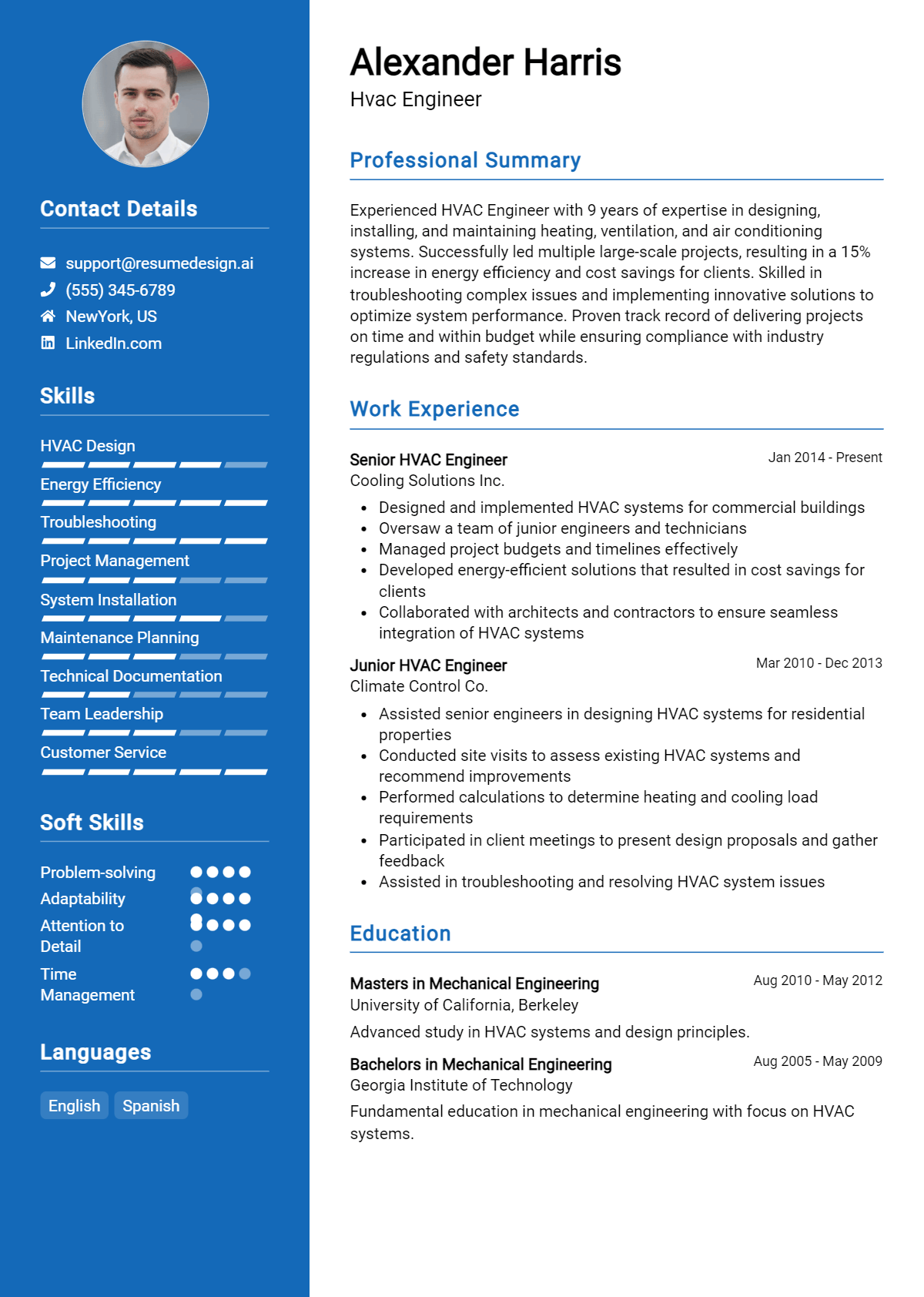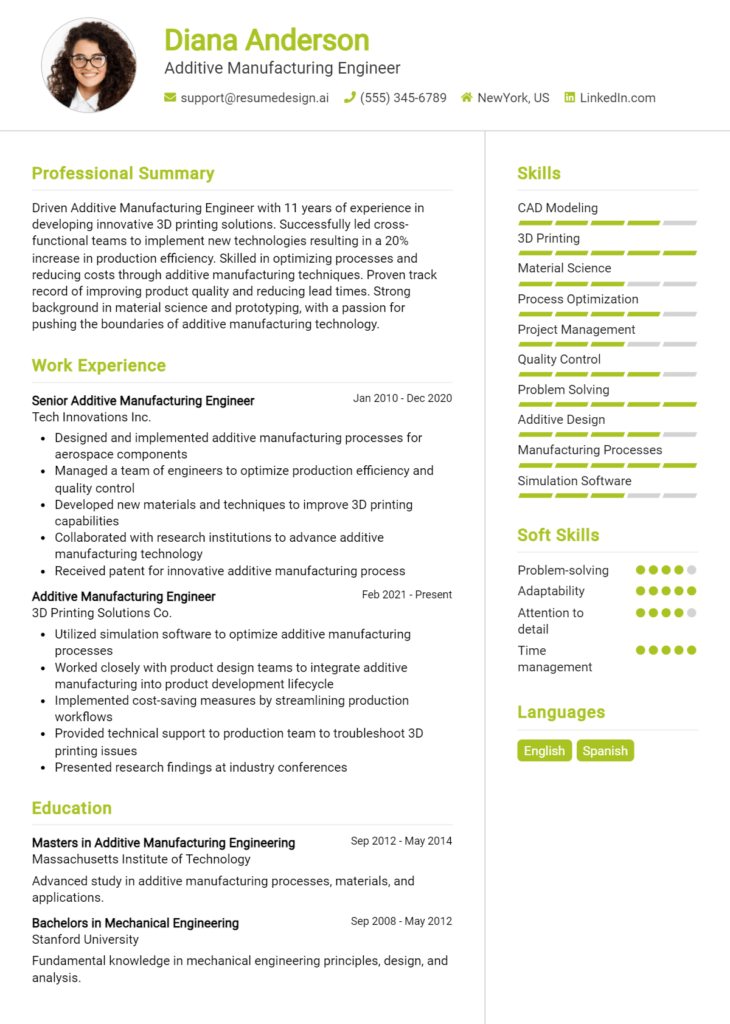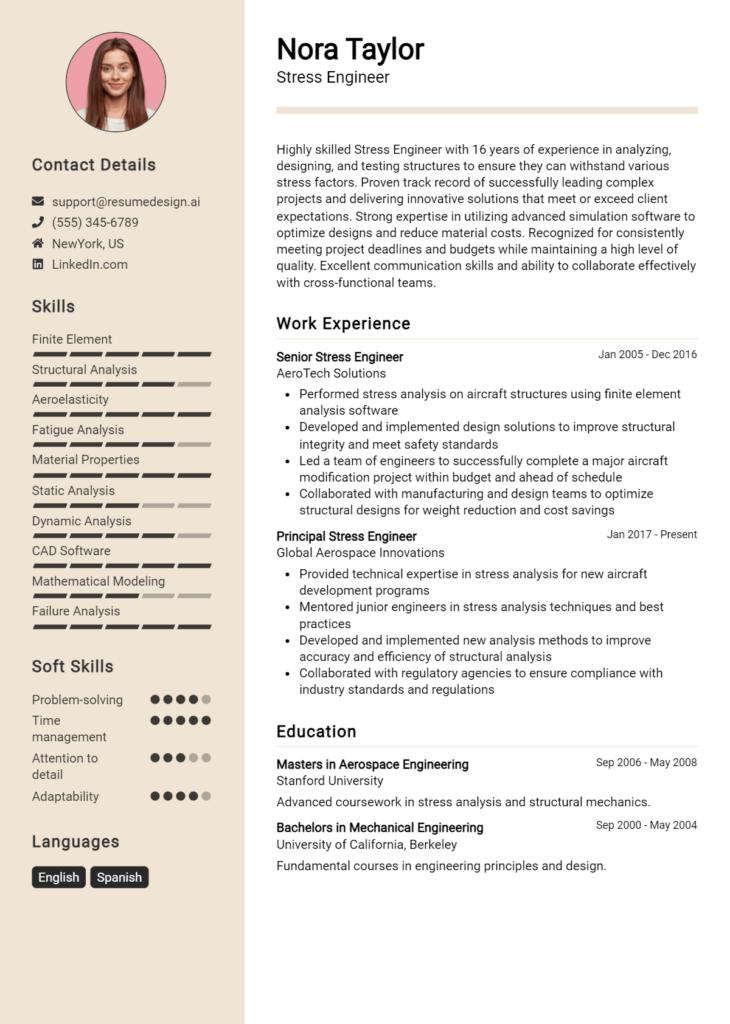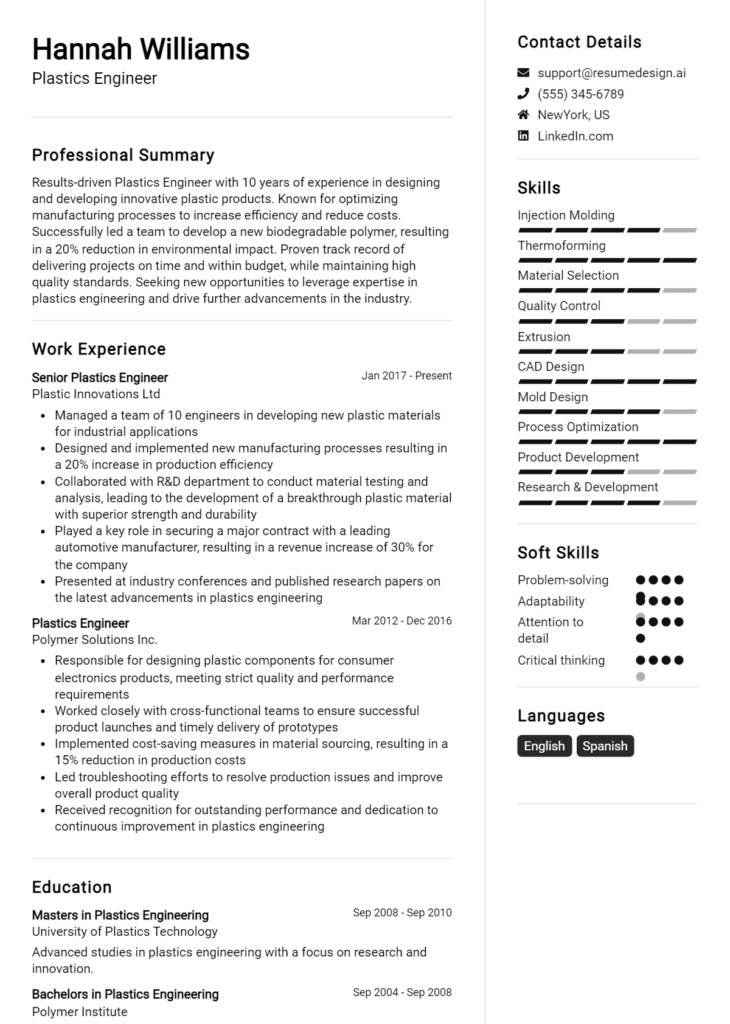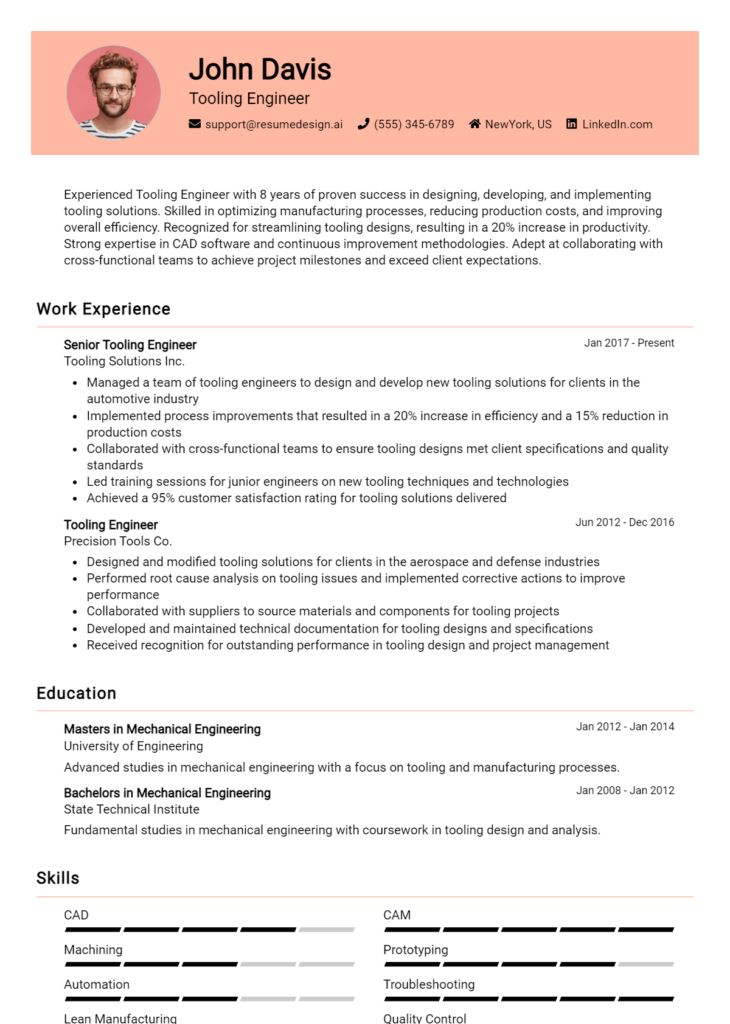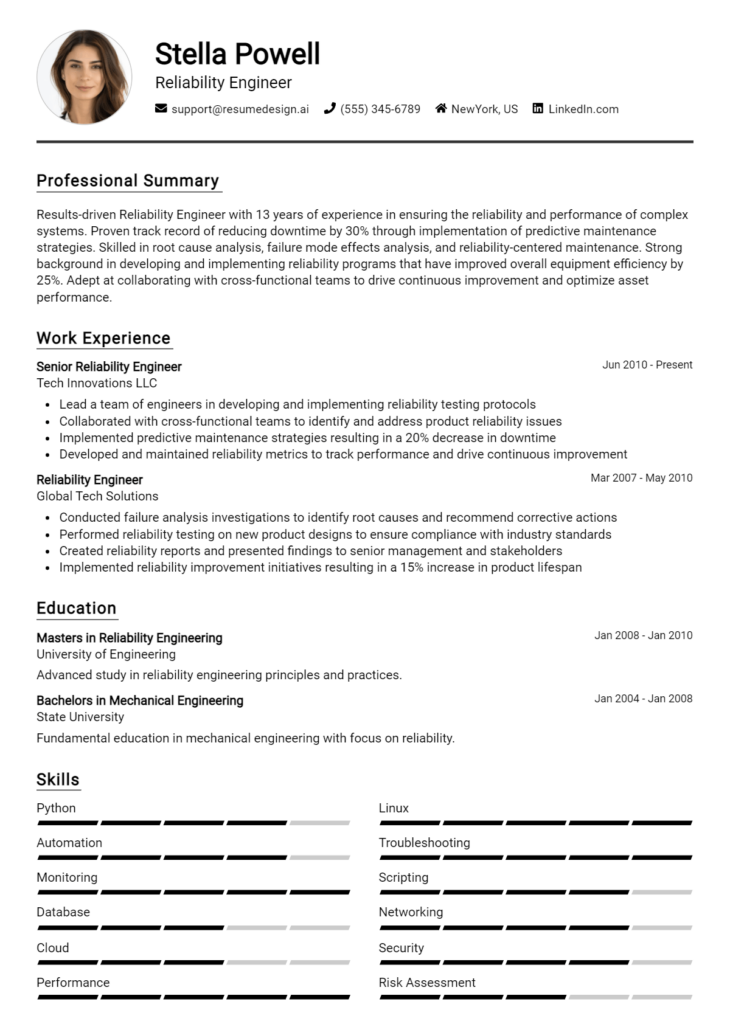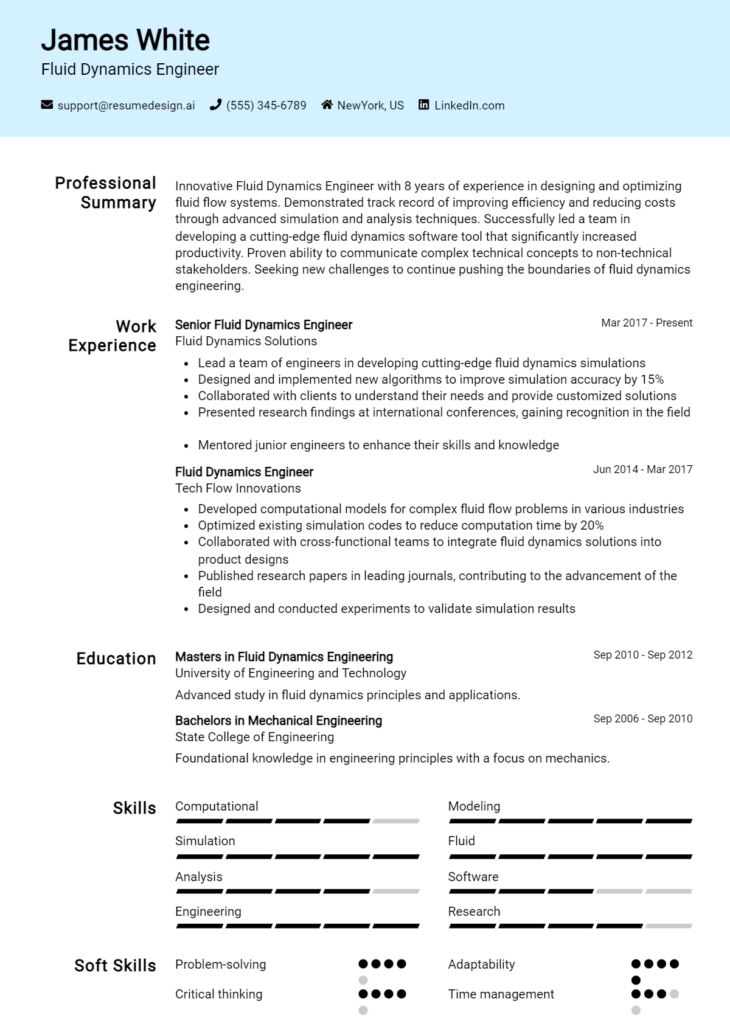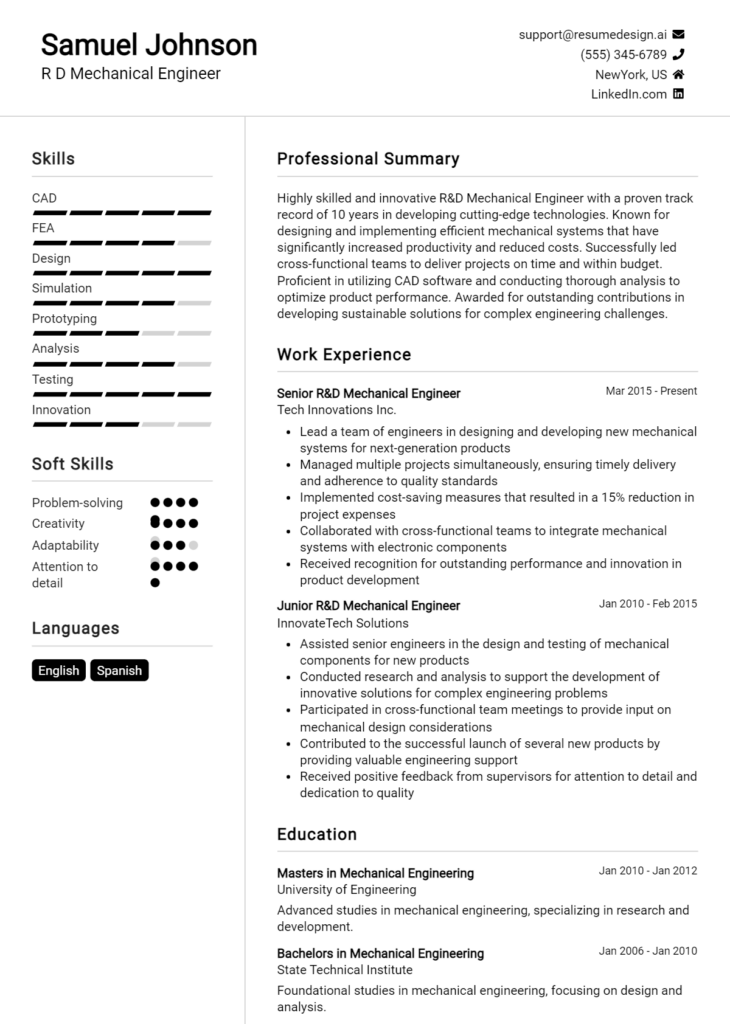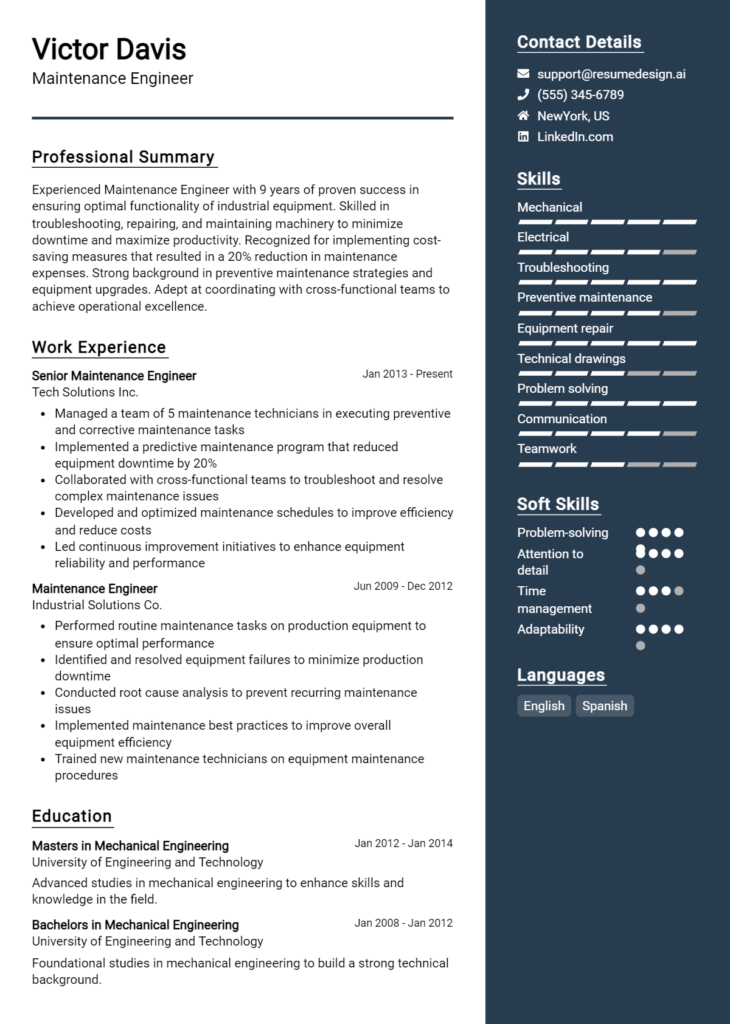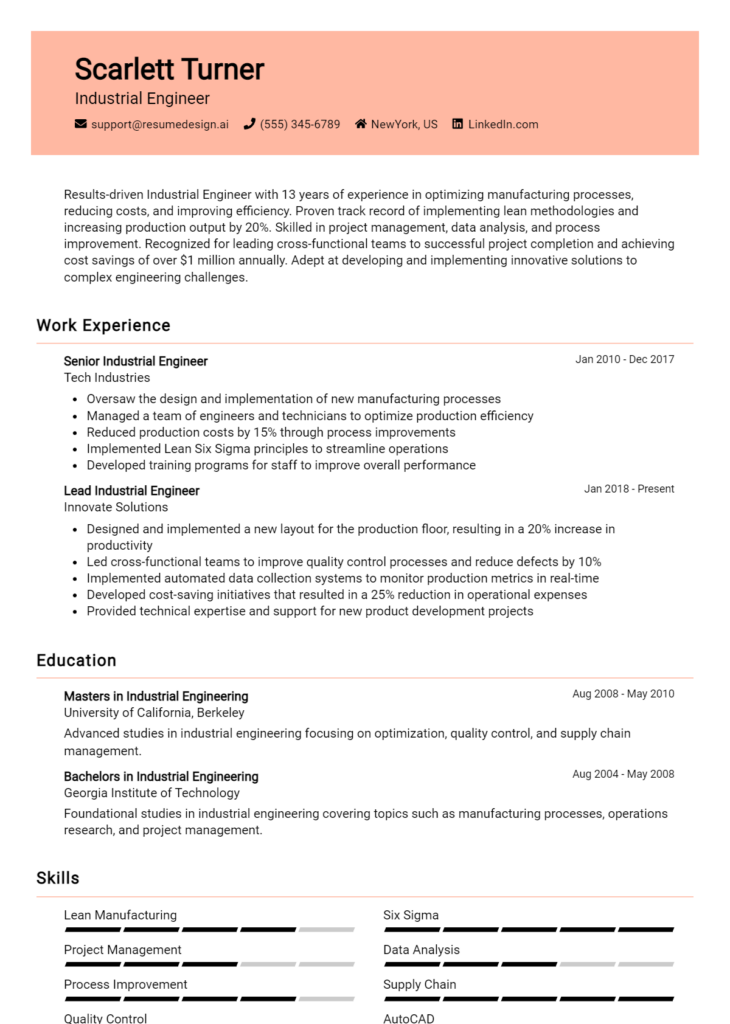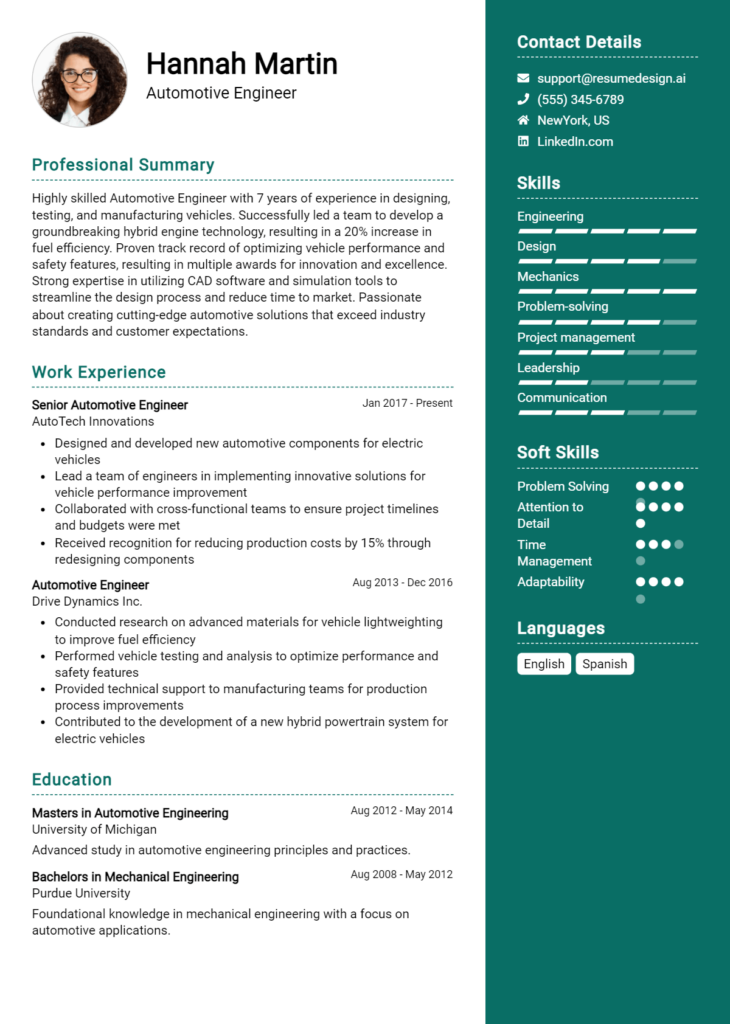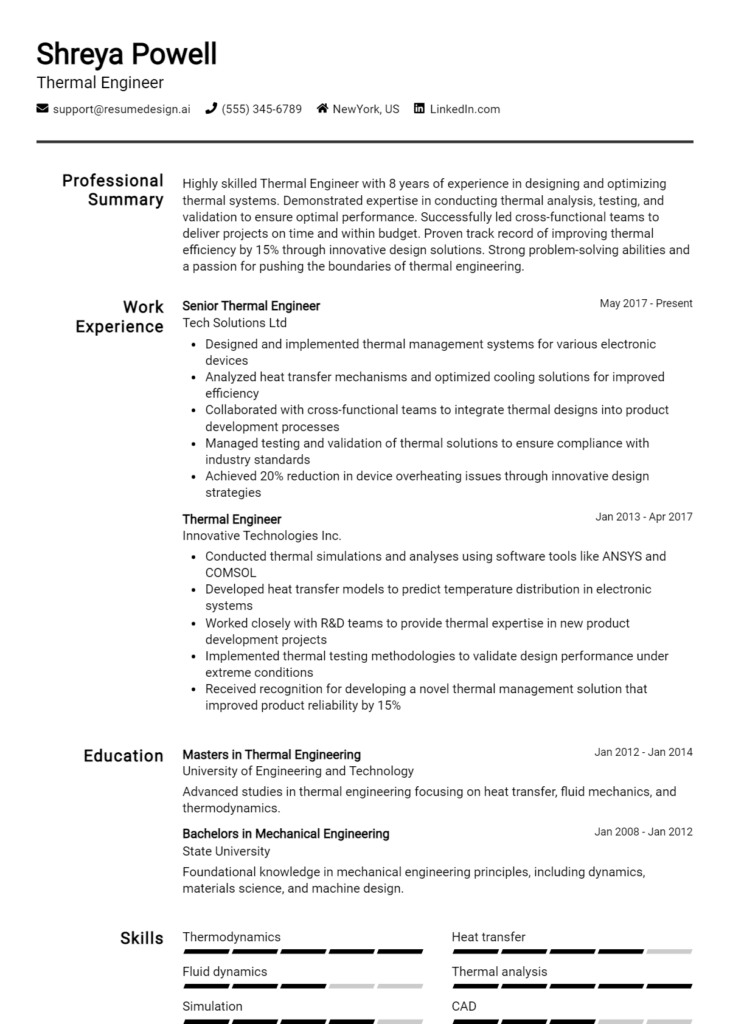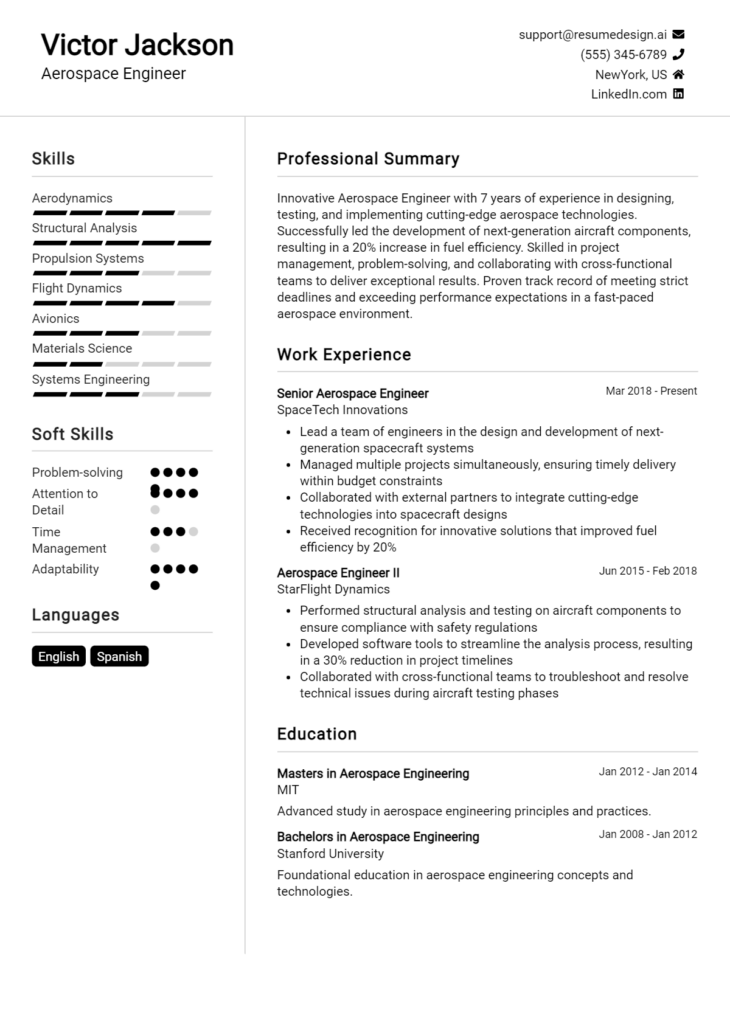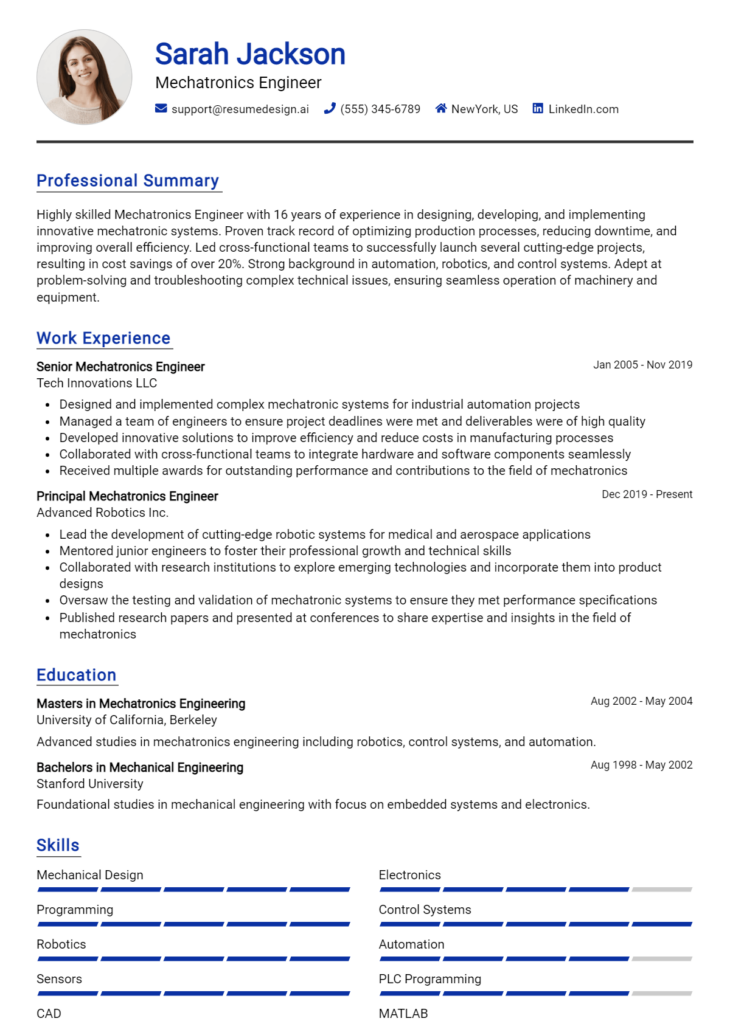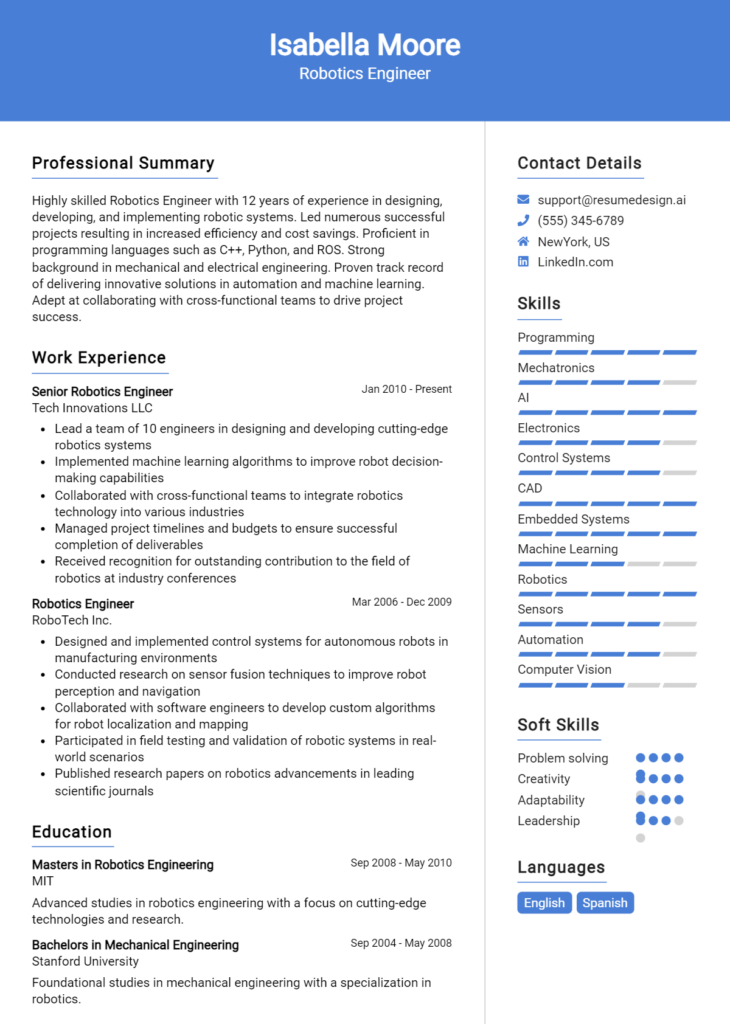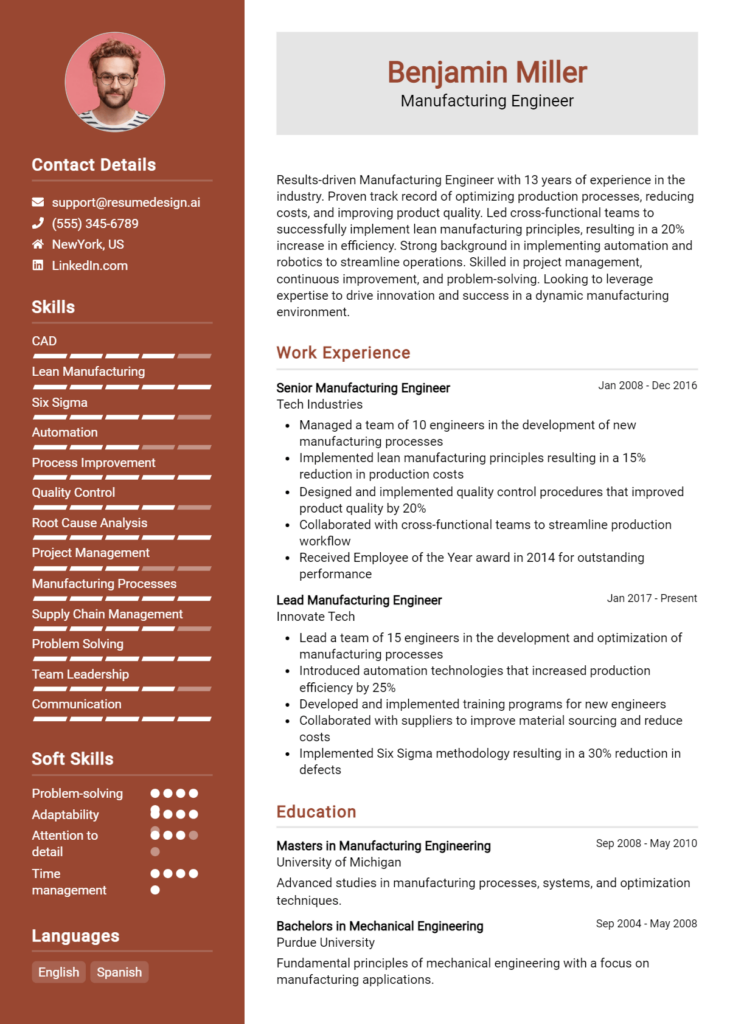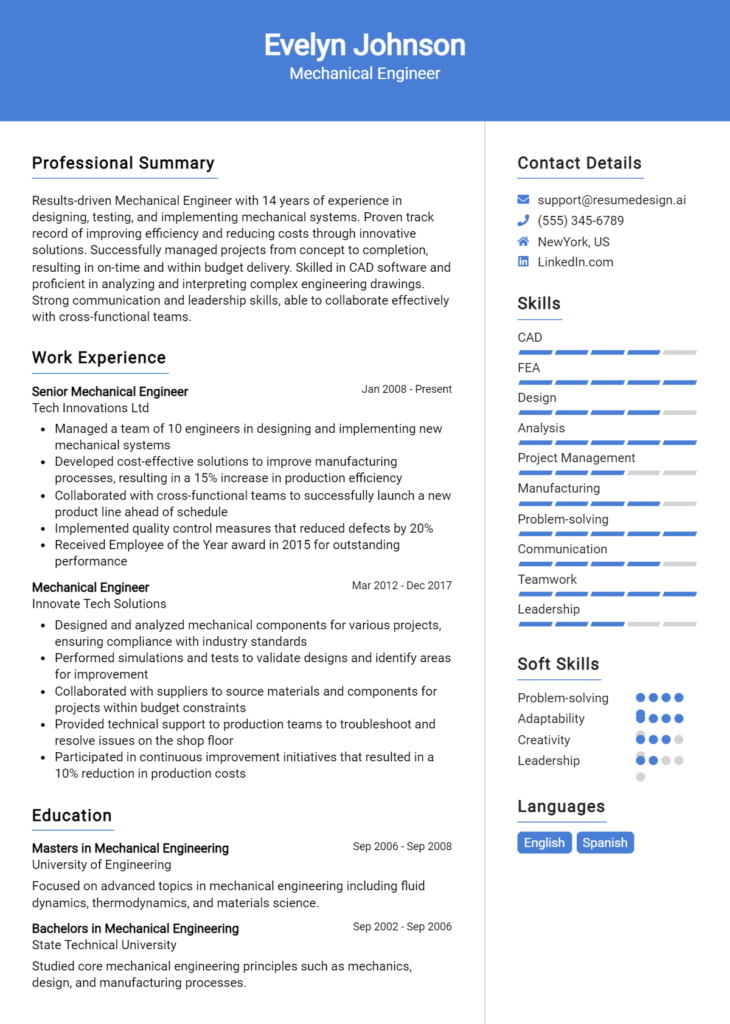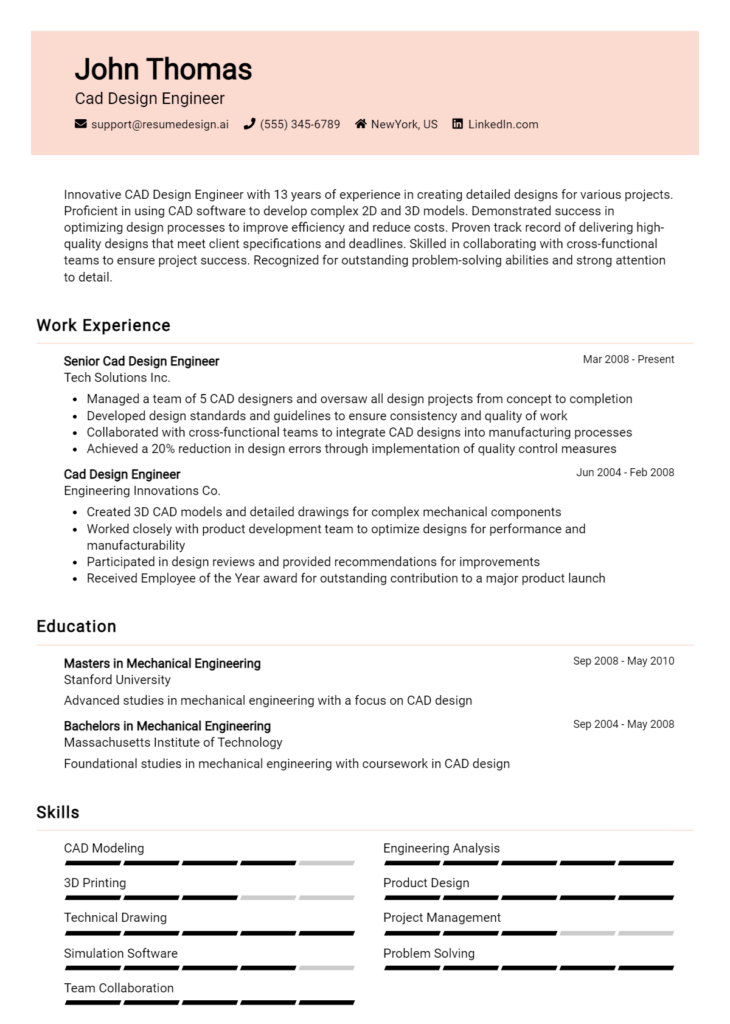HVAC Engineer Core Responsibilities
HVAC Engineers play a critical role in designing, installing, and maintaining heating, ventilation, and air conditioning systems, ensuring optimal environmental conditions. They must possess strong technical knowledge, operational expertise, and excellent problem-solving skills to effectively collaborate with architects, contractors, and facility managers. These competencies significantly contribute to the organization’s efficiency and sustainability goals. A well-structured resume that highlights these qualifications can effectively demonstrate an HVAC Engineer’s value and versatility across various functions.
Common Responsibilities Listed on HVAC Engineer Resume
- Design and implement HVAC systems for residential, commercial, and industrial applications.
- Conduct energy audits and recommend energy-efficient solutions.
- Collaborate with architects and contractors to ensure system integration.
- Perform system troubleshooting and maintenance to ensure optimal performance.
- Prepare technical specifications and project documentation.
- Oversee installation and commissioning of HVAC equipment.
- Ensure compliance with building codes and safety regulations.
- Analyze system performance data and make necessary adjustments.
- Provide technical support and training to staff and clients.
- Manage project budgets and timelines effectively.
- Stay updated on industry trends and technological advancements.
High-Level Resume Tips for HVAC Engineer Professionals
In today's competitive job market, a well-crafted resume is essential for HVAC Engineer professionals looking to make a strong impression on potential employers. Your resume serves as the first glimpse of your qualifications, skills, and achievements, and it is crucial that it reflects your expertise in the HVAC field. A carefully tailored resume not only highlights your technical abilities but also showcases your accomplishments, setting you apart from other candidates. This guide will provide practical and actionable resume tips specifically designed for HVAC Engineer professionals, helping you to effectively present your qualifications and stand out in the hiring process.
Top Resume Tips for HVAC Engineer Professionals
- Tailor your resume to match the job description, focusing on keywords and skills mentioned in the posting.
- Highlight relevant experience by showcasing specific HVAC projects you’ve worked on, detailing your role and impact.
- Quantify your achievements with metrics, such as energy savings or project completion times, to demonstrate your effectiveness.
- Include industry-specific skills, such as knowledge of HVAC systems, energy efficiency regulations, and design software.
- Use action verbs to describe your responsibilities and accomplishments, making your contributions clear and impactful.
- Incorporate certifications and licenses relevant to HVAC engineering, as these can enhance your credibility.
- Keep your layout clear and professional, using headings, bullet points, and consistent formatting to improve readability.
- Proofread carefully to eliminate any spelling or grammatical errors, which can detract from your professionalism.
- Consider including a summary statement at the top of your resume that encapsulates your career goals and key qualifications.
- Network by including links to professional profiles or portfolios to showcase your work and further connect with potential employers.
By implementing these resume tips, HVAC Engineer professionals can significantly enhance their chances of landing a job in the field. A focused and well-structured resume that effectively demonstrates your skills and achievements will not only capture the attention of hiring managers but also position you as a strong candidate ready to contribute to their team.
Why Resume Headlines & Titles are Important for HVAC Engineer
In the competitive field of HVAC engineering, having a standout resume is crucial for capturing the attention of hiring managers. Resume headlines and titles serve as the first impression a candidate makes, acting as a concise summary of their key qualifications in a powerful phrase. A strong headline can immediately draw attention and set the tone for the rest of the resume, making it essential for job seekers to craft a title that is not only relevant to the position but also showcases their unique skills and experiences. A well-crafted headline should be concise, directly related to the job being applied for, and tailored to resonate with the needs of potential employers.
Best Practices for Crafting Resume Headlines for HVAC Engineer
- Keep it concise—ideally one sentence or phrase.
- Use industry-specific terminology to demonstrate expertise.
- Highlight your most relevant skills or experiences.
- Tailor the headline to match the job description.
- Use action-oriented language that conveys a sense of achievement.
- Avoid vague terms; be specific about your role or contributions.
- Incorporate quantifiable achievements, if possible.
- Stay professional and avoid overly casual language.
Example Resume Headlines for HVAC Engineer
Strong Resume Headlines
Certified HVAC Engineer with 10+ Years in Energy Efficiency Solutions
Expert in HVAC System Design and Implementation with Proven Track Record
Results-Driven HVAC Engineer Specializing in Sustainable Building Practices
Weak Resume Headlines
Experienced Engineer
HVAC Professional Looking for Opportunities
The strong headlines are effective because they immediately convey specific skills, experiences, and achievements relevant to the HVAC engineering field, making the candidate stand out in a crowded job market. In contrast, the weak headlines lack specificity and clarity, failing to communicate the candidate's strengths or unique qualifications, which can lead to missed opportunities in the hiring process.
Writing an Exceptional HVAC Engineer Resume Summary
A well-crafted resume summary is essential for HVAC Engineers as it serves as the first impression a hiring manager receives of a candidate's qualifications. This concise introduction captures the attention of employers by highlighting key skills, relevant experience, and notable accomplishments pertinent to the job role. An impactful summary should not only be concise but also tailored to the specific job the candidate is applying for, ensuring that it resonates with the requirements outlined in the job description.
Best Practices for Writing a HVAC Engineer Resume Summary
- Quantify Achievements: Use numbers and metrics to demonstrate your impact, such as energy savings or project budgets managed.
- Focus on Skills: Highlight both technical and soft skills that are directly relevant to the HVAC field.
- Tailor for the Job Description: Customize your summary to reflect the specific requirements and keywords from the job posting.
- Be Concise: Aim for 3-5 sentences that effectively convey your qualifications without being overly verbose.
- Showcase Relevant Experience: Include your most pertinent work history that aligns with the HVAC Engineer role.
- Highlight Certifications: Mention any relevant certifications or licenses that enhance your credibility in the field.
- Use Action Verbs: Start sentences with strong action verbs to convey a sense of proactivity and achievement.
- Avoid Clichés: Steer clear of generic phrases that don’t add value or specificity to your summary.
Example HVAC Engineer Resume Summaries
Strong Resume Summaries
Results-driven HVAC Engineer with over 8 years of experience in designing and optimizing HVAC systems, achieving energy efficiency improvements of up to 30% for commercial buildings. Proficient in AutoCAD and Revit with a proven track record of managing projects with budgets exceeding $500,000.
Detail-oriented HVAC Engineer with extensive expertise in HVAC design and installation, leading a team that reduced installation time by 25% while maintaining compliance with industry standards. Certified in LEED and proficient in energy modeling software.
Innovative HVAC Engineer with a focus on sustainable design, recognized for implementing a new cooling system that resulted in a $20,000 annual cost savings for a large retail client. Strong background in project management and customer relations.
Weak Resume Summaries
Experienced HVAC Engineer seeking new opportunities in a challenging environment.
HVAC professional with skills in various areas looking to contribute to a team.
The examples of strong resume summaries are considered effective because they provide specific achievements, quantify results, and directly align with the competencies sought by employers in the HVAC field. In contrast, the weak summaries fail to convey any measurable impact or relevant experience, making them too vague and generic to capture the interest of hiring managers.
Work Experience Section for HVAC Engineer Resume
The work experience section of an HVAC Engineer resume is crucial as it provides a comprehensive overview of the candidate's technical skills, leadership capabilities, and ability to deliver high-quality engineering solutions. This section not only highlights relevant job roles and responsibilities but also emphasizes the candidate's accomplishments in previous positions. By quantifying achievements and aligning experiences with industry standards, candidates can effectively demonstrate their value and readiness for advanced roles in the HVAC field.
Best Practices for HVAC Engineer Work Experience
- Clearly outline your job responsibilities, focusing on technical tasks relevant to HVAC systems.
- Quantify your achievements using metrics such as cost savings, efficiency improvements, and project timelines.
- Highlight leadership roles by detailing your experience in managing teams or projects.
- Include specific technologies and tools used in your previous positions to showcase your technical expertise.
- Align your experiences with industry standards and best practices to demonstrate your knowledge of the field.
- Use action verbs to describe your contributions, making your experiences more dynamic and impactful.
- Tailor your work experience to match the job description of the position you are applying for.
- Incorporate feedback from past projects or collaborations to illustrate teamwork and communication skills.
Example Work Experiences for HVAC Engineer
Strong Experiences
- Led a team of 5 engineers in the design and implementation of an energy-efficient HVAC system for a commercial building, resulting in a 30% reduction in energy costs.
- Managed the installation of a complex HVAC system for a multi-story residential project, completed 2 weeks ahead of schedule while maintaining a budget under $500,000.
- Developed a predictive maintenance program that increased system reliability by 40% and reduced emergency repair costs by 25% over two years.
- Collaborated with architects and construction teams to optimize HVAC designs for LEED certification, achieving a Silver rating for a major client.
Weak Experiences
- Worked on HVAC systems.
- Helped with projects.
- Responsible for maintenance tasks.
- Assisted in meeting project deadlines.
The examples provided illustrate the distinction between strong and weak work experiences. Strong experiences are characterized by specific achievements, quantifiable results, and a clear demonstration of leadership and technical skills. In contrast, weak experiences lack detail, specificity, and measurable outcomes, making it difficult for potential employers to gauge the candidate's contributions and capabilities in the HVAC field.
Education and Certifications Section for HVAC Engineer Resume
The education and certifications section of an HVAC Engineer resume is crucial for demonstrating the candidate's foundational knowledge and specialized expertise in the field. This section effectively showcases the academic qualifications relevant to HVAC systems, alongside industry-recognized certifications that validate the engineer's skills and competencies. By including pertinent coursework, certifications, and any specialized training, candidates can significantly enhance their credibility and illustrate their commitment to continuous learning and professional development, which is essential in a rapidly evolving industry.
Best Practices for HVAC Engineer Education and Certifications
- Include only relevant degrees that pertain to HVAC engineering, such as Mechanical Engineering or Building Systems Engineering.
- List certifications from recognized organizations, such as ASHRAE, EPA, or NATE, to showcase industry standards.
- Provide detailed information about specialized training related to HVAC systems, including courses on energy efficiency or advanced HVAC controls.
- Highlight any continuing education courses or workshops that demonstrate your commitment to staying updated with industry trends and technologies.
- Use specific titles for certifications and degrees to ensure clarity and recognition by hiring managers.
- Consider including your GPA if it is strong and directly relates to your HVAC coursework.
- Organize the section in reverse chronological order to emphasize your most recent and relevant qualifications.
- Ensure that all listed credentials are current and not expired to maintain credibility.
Example Education and Certifications for HVAC Engineer
Strong Examples
- Bachelor of Science in Mechanical Engineering, University of Technology, 2020
- Certified HVAC Designer (CHD), American Society of Heating, Refrigerating and Air-Conditioning Engineers (ASHRAE), 2021
- EPA Section 608 Certification for Universal Refrigerant Handling, 2022
- Coursework in Thermodynamics, Fluid Mechanics, and Energy Management, University of Technology
Weak Examples
- Associate Degree in General Studies, Community College, 2015
- Certification in Basic Electrician Skills, 2010
- High School Diploma, 2010
- Outdated HVAC Certification from a non-recognized institution, 2018
The examples are considered strong because they are directly relevant to the HVAC engineering field, showcasing recognized degrees and certifications that align with industry standards. They demonstrate a solid educational background and a commitment to professional development. Conversely, the weak examples lack relevance to the HVAC role, showcasing outdated or generic qualifications that do not enhance the candidate's profile in the competitive job market for HVAC engineers.
Top Skills & Keywords for HVAC Engineer Resume
As an HVAC Engineer, showcasing the right skills on your resume is crucial to stand out in a competitive job market. Employers seek candidates who not only possess technical expertise but also demonstrate strong interpersonal skills that enhance teamwork and project outcomes. By highlighting both hard and soft skills, you can effectively communicate your qualifications and readiness to tackle HVAC challenges. This balanced skill set will not only improve your employability but also reflect your ability to contribute positively to any engineering team. For more insights on how to effectively present your skills and work experience, continue reading.
Top Hard & Soft Skills for HVAC Engineer
Soft Skills
- Problem-solving
- Communication
- Team collaboration
- Time management
- Critical thinking
- Attention to detail
- Adaptability
- Customer service orientation
- Project management
- Leadership
Hard Skills
- Proficiency in HVAC design software (e.g., AutoCAD, Revit)
- Knowledge of building codes and regulations
- HVAC system installation and maintenance
- Energy efficiency analysis
- Load calculation and analysis
- Refrigeration cycle understanding
- Duct design and airflow analysis
- Familiarity with HVAC controls and automation
- Troubleshooting and diagnostics
- Knowledge of thermodynamics and fluid dynamics
Stand Out with a Winning HVAC Engineer Cover Letter
I am writing to express my interest in the HVAC Engineer position at [Company Name], as advertised on [where you found the job listing]. With a Bachelor’s degree in Mechanical Engineering and over [X years] of hands-on experience in designing, installing, and maintaining HVAC systems, I am confident in my ability to contribute effectively to your team. My background in energy-efficient technologies and regulatory compliance uniquely positions me to support [Company Name] in delivering exceptional HVAC solutions that enhance both comfort and efficiency.
Throughout my career, I have successfully managed multiple HVAC projects from conception to completion. At [Previous Company Name], I led a team in the design and implementation of an innovative HVAC system for a commercial building that resulted in a [percentage]% reduction in energy costs. My proficiency in using industry-standard software, such as AutoCAD and Revit, enables me to create detailed schematics and ensure accurate system layouts. I also prioritize staying up-to-date with the latest developments in HVAC technology, including smart systems and renewable energy applications, which I believe aligns with [Company Name]'s commitment to sustainability.
Collaboration is key in our field, and I take pride in my ability to work effectively with cross-functional teams, including architects, contractors, and facility managers. I believe that clear communication and strong relationships are essential to successful project completion. Additionally, I have developed a keen understanding of local building codes and regulations, ensuring that all projects I oversee adhere to the highest standards of safety and quality. I am excited about the opportunity to bring my expertise in HVAC engineering to [Company Name] and contribute to the delivery of innovative and reliable systems.
Thank you for considering my application. I am looking forward to the possibility of discussing how my skills and experiences align with the needs of your team. I am eager to contribute to [Company Name] and help drive success in your HVAC projects. Please feel free to contact me at [Your Phone Number] or [Your Email Address] to arrange a convenient time for an interview.
Common Mistakes to Avoid in a HVAC Engineer Resume
When creating a resume as an HVAC Engineer, it's essential to present your skills and experience effectively to stand out in a competitive job market. Many candidates make critical mistakes that can undermine their qualifications and reduce their chances of landing an interview. To help you avoid these pitfalls, here are some common mistakes HVAC Engineers should be mindful of when crafting their resumes:
Using a Generic Template: Relying on a one-size-fits-all resume template can make you appear unprofessional. Tailoring your resume to highlight specific skills and experiences relevant to HVAC engineering is crucial.
Neglecting Technical Skills: Failing to detail your technical skills, such as proficiency in HVAC design software, CAD tools, or knowledge of building codes, can lead to your resume being overlooked by hiring managers.
Omitting Certifications: Not mentioning relevant certifications, such as EPA 608, NATE certification, or LEED accreditation, can diminish your credibility. Be sure to highlight these qualifications prominently.
Overloading with Jargon: While it's important to showcase your technical expertise, using excessive jargon or complex terminology can confuse hiring managers. Aim to communicate your skills clearly and concisely.
Ignoring Achievements: Listing job duties without emphasizing your accomplishments can make your resume less impactful. Use metrics and specific examples to demonstrate how you contributed to previous projects.
Inconsistent Formatting: A poorly formatted resume with inconsistent fonts, sizes, and styles can detract from your professionalism. Ensure your formatting is uniform and easy to read.
Focusing Too Much on Education: While your educational background is important, emphasizing practical experience and hands-on skills is often more relevant for HVAC engineers. Prioritize work experience that showcases your expertise.
Not Tailoring for Each Job Application: Sending the same resume for every job application can be detrimental. Customize your resume to align with the specific requirements and responsibilities of each role you apply for, demonstrating your genuine interest in the position.
Conclusion
As an HVAC Engineer, it's essential to present your skills and experiences effectively to stand out in a competitive job market. Throughout this article, we've highlighted the vital competencies that employers look for, such as proficiency in system design, knowledge of industry standards, and experience with energy-efficient technologies. We also discussed the importance of certifications and continuous education in keeping your skills relevant.
Now that you have insights into what makes an impressive HVAC Engineer resume, it's time to take action. Review your resume to ensure it reflects your qualifications and accomplishments accurately. Consider utilizing the following resources to elevate your resume:
- Explore a variety of resume templates to find a design that suits your professional style.
- Use our user-friendly resume builder to create a polished and tailored document quickly.
- Check out resume examples for inspiration and guidance on how to structure your content effectively.
- Don’t forget to craft a compelling cover letter with our cover letter templates to make a strong first impression.
Take the next step in your career by refining your resume today!

